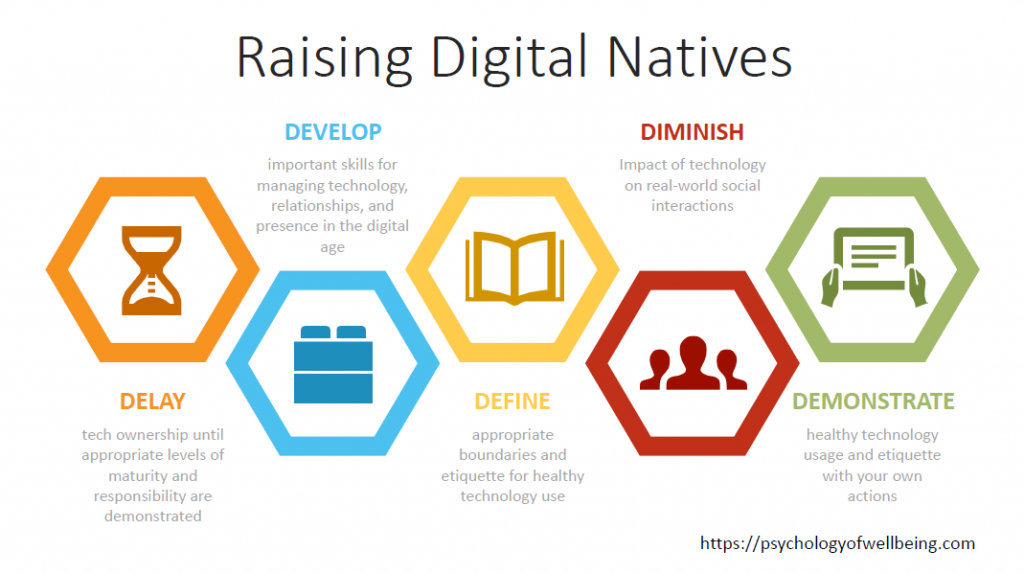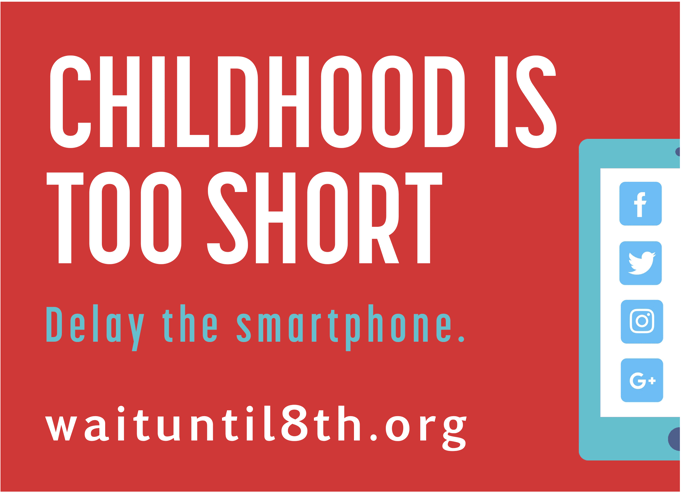
Warning: this post is at least twice as long as the typical articles on this blog. I hope you find it is worth your time . . .
As a father of two boys, now 6 and 7 years old, I’m thinking a lot about what it means to be raising digital natives in the modern age. We are the first generation to be raising kids who are born into the age of mobile technology, and we are completely underqualified, having had no personal experience of what it is like to grow up with technology. What do the experts say? There are no experts . . . this is a new frontier and we are all trying to figure out how to navigate in this strange new world.
This week, I gave a talk to the parents at my sons’ school and gave them 5 ideas for thinking about how to raise kids in the age of technology:
- Delay technology use and ownership until appropriate levels of maturity and responsibility are demonstrated.
I can think of few advantages to giving kids earlier access to technology. The technology is getting easier and more intuitive to use, so it’s not like kids need a “head start” on figuring it out. And we don’t even know yet the long-term impact (on vision, on posture, on mental health, on emotional wellbeing) of kids who grow up staring at screens from a young age. What we do know is that technology is a powerful tool and it can be easy to get into trouble. It is also a bit of a “Pandora’s Box.” Once you open that door, it is very difficult to get it closed again.
In the U.S., there is a campaign called “Wait until 8th” urging parents to pledge not to give their kids a smartphone until 8th grade (or around 14 years of age.) This is a big commitment considering the average age for a first smartphone is now 10 years old (and dropping every year.) The nice thing about this campaign is it is so much easier to stick to if you can get an entire school or community to agree to the same policy. Otherwise, the social pressure ramps up pretty quickly and even the most resolute parent ends up caving in (which is why the age for smartphone usage keeps dropping.) The Wait until 8th slogan is a good one: “let kids be kids a little longer.”
It is easy for parents to give up under the pressure and the feelings of inevitability that seem to be part and parcel of technological progress. But there are pockets of inspiration, like this family that managed to raise a teenage girl to the ripe old age of 18 without ever having a smartphone. I’ve heard lots of parents express regret at giving access to technology too soon, but the few families who manage to delay seem pretty happy with the outcomes.
- Develop important skills for managing technology, relationships and presence in the digital age.
We understand that kids need to develop and mature before they get access to a motor vehicle. But many parents seem to be OK to simply “hand over the keys” to technology to their young kids. Considering a smartphone contains all the world’s information and a connection to every person on the planet, good or bad, it is a pretty powerful tool and a responsibility that should not be given lightly.
We should help our kids to develop technological literacy the same way we allow them to gradually develop driving skills. Kids aren’t just handed a car at a very young age. First, they observe their parent driving. Then they get some education around driving in school. Then they are allowed to drive with adult supervision, and finally they get their own license. Eventually, once they have proven themselves responsible, they might even get their own car, but only after all the other steps have been passed.
Technology should also have this progressive approach. It is all too easy to use technology as the digital babsitter, and plop kids in front of a screen while we are busy doing something else. But kids need interactive learning experiences, where they can use technology with an adult by their side, learning about the potential challenges and risks along with the amazing benefits.
Not only do kids need to learn how to use technology, they also need to learn how to not use technology. I hear a lot of parents say, “I had to get my son a smartphone because he has a 45 minute bus ride to school, and I don’t want him to get bored.” If we teach our kids to turn to technology to fill every moment of boredom or discomfort, this strategy will stay with them their entire life. In doing so, we strip them of the opportunity to learn how to be alone with their thoughts, how to manage their own emotions, and how to be creative in figuring out what to do, or how to connect with those around them. The technology is a great tool, and it’s nice to have, but it always comes at some sacrifice. Sometimes, it’s better to let kids be bored.
- Define appropriate boundaries and etiquette for healthy technology use.
It’s hard to find clear guidelines for “healthy” technology use. The platforms are changing so rapidly, we don’t really know what is healthy. The American Academy of Pediatrics gives the following guidelines:
Children under 18 months >> no screen time
Children 18-24 months >> limited high quality programming with parents
Children 2-5 years >> 1 hour per day, high quality programming with parents
Children 6 years >> Consistent limits, and monitor sleep and physical activity, etc.
All ages >> Designate media-free times and media-free zones for family interaction
>> Ongoing interaction about online citizenship and safety
For Mandarin Oriental Hotel Group, we created a “Digital Wellness Manifesto,” where participants can fill in the blanks to create their own household rules around technology. Items include:
“These are the three things I will do in the morning before looking at technology:________________,_________________,________________.”
“Each week, I reserve this day for non-digital activities with loved ones:____________________.”
Naturally, the rules will vary family by family and household by household. But everyone should have some guidelines in place to keep technology use in check.
To see what happens when no boundaries are in place, check out this family who made an experiment out of giving their kids unfettered access to technology for a full weekend. Chaos ensues.
- Diminish the impact of technology use on real world social interactions.
A couple of weeks ago I was at my younger son’s rugby match and one of the kids had his father’s cellphone. Immediately, all of the kids gathered around to watch him play video games. I’ve seen this countless times: at the beach, in a restaurant, out on a boat, at a playground; as soon as one child has a device, the social dynamic completely changes. With a device, the kids immediately become glued to the screen. Without a device, they have to figure things out, they have to be creative, a leader has to emerge, they have to figure out how to work together.
Bringing a phone into a social setting removes great opportunities for kids to develop social skills. And the device doesn’t only impact that child, it changes the dynamic for every child in the vicinity. As parents, we hope to teach our kids not to use devices around other children who don’t have them and not to allow devices to interfere with real-world social interaction.

- Demonstrate healthy technology usage and etiquette with our own actions.
Ok, let’s be real. This may be the hardest one on the list. We can withhold technology from our kids and tell them they have to brush their teeth in the morning before they look at a device, but how good are we really at practicing what we preach.
In my case, the answer would be a resounding “not very good.” While our family has sheltered our children from screens (we don’t even have a TV) I have spent much of their early years staring down at my phone or ipad. Hypocrite much?
As my kids are getting older (and more savvy about the ways of the world) I have realized that my behavior needs to change. So recently my wife and I have created a new household rule: we do not look at screens in front of our kids. This doesn’t mean we are off of technology, we just keep it undercover. If we need to look at a device, we slip into another room, keeping out of sight of the little ones. One consequence of this is that we spend a lot more time in the bathroom now (try to keep that visual out of your head the next time you get a text from me.) But when we come back into the living room, our devices are put away and we are more connected to each other.
I don’t know how impactful this strategy will be on the development of our kids, but for us personally, I think it has been profound. Some people would argue that they have a million reasons why they must be more connected to their devices. But actually, technology tends to give us the feeling of being productive, without actually helping us to get anything meaningful done.
Keeping technology out of sight of our kids has forced me to bring out certain “ancient artefacts” such as paperback books, clocks, wristwatches, a camera for taking pictures, and my old metronome for guitar practice. The advantage of these outdated “single function” devices is that they allow you to focus on what you intended to do without opening up a window into a whole other world of notifications, e-mails and social media. When I do need to get some real work done, I sit down at my computer, do what I need to do, and then can be more present for the rest of the day. So in my case, cutting back on technology use at home has made me more productive, not less. Most importantly, I am modeling for my kids that we don’t use technology when around other people, an important lesson that will be hard to enforce if we can’t exhibit it ourselves.
These are the topics I’m thinking of in my own family for how to raise digital natives. Your strategy may be different. But the main thing is to have a strategy. Without it, our kids’ relationship to technology will be determined by the technology companies and their advertisers. Not good!
Our kids are young enough that we can still afford a certain level of naivete about what is coming. Some parents of older kids laugh at some of my suggestions and say, “yeah, good luck with that!” I realize none of this is easy and it will only get harder as our kids get older and our technology gets smarter. If you have found something that works for your family, I would love to hear about it.
by Jeremy McCarthy
Follow me on twitter, facebook or instagram.
See my recent talk on “Wellness in the Age of Technology” from the Global Wellness Summit:


[…] post Raising Digital Natives appeared first on The Psychology of […]